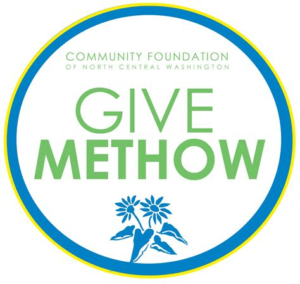The Latest & Greatest Beaver Happenings
Beavers are in the news more and more these days and for good reason. Beavers offer tremendous benefits to our watersheds including increased and extended water storage, climate refugia and resilience, increased biodiversity, and reduced impact from extreme drought, wildfire, and flooding. We want to make sure the best available, and most fun, beaver science and information is available on our website for all to know and share and find hope in.
Check out this fantastic video from Big Hole Watershed Committee sharing their work and success in restoring woody structure to streams, slowing down water, and supporting the return of natural processes in working landscapes of Montana. This is what our WA Dept of Ecology Streamflow Restoration Grant and Wildlife Conservation Society's CAF support will allow us and our partners to do in 8 wildfire impacted streams of the Okanogan & Methow River watersheds. So inspiring!!!

MBP was recently awarded Wildlife Conservation Society's Climate Adaptation Fund's Implementation Award to restore woody structure and beavers in 8 wildfire impacted tributaries of the Methow and Okanogan River watersheds. This work is being done in collaboration with private landowners, WA Dept of Ecology, WA Dept of Fish and Wildlife, WA Dept of Natural Resources, the Confederated Tribes of the Colville Reservation, and the communities of Okanogan County. We are grateful for this opportunity to restore natural stream processes that slow and store seasonal water, support critical fish and wildlife habitat, and rebuild resilience to climate change, including wildfires, back into our watersheds.
Read the full announcement below and visit all the grantee websites. There are so many amazing projects and people working on our climate challenges! Volunteering and being a part of the many needed climate solutions is a great way to help move the needle on climate adaptation and sustainability! Reach out to us to learn more about lending your hands on our upcoming stream restoration projects in Summer 2022! And stay tuned for more information. www.methowbeaverproject.com alexa.mbp@methowsalmon.org
The Wildlife Conservation Society (WCS) is pleased to announce 11 new Grants totaling $2.65 million through its Climate Adaptation Fund, a program made possible by the generous support of the Doris Duke Charitable Foundation. These grants represent some of the most innovative thinking and best examples of on-the-ground efforts to help wildlife, ecosystems, and people who depend on them adapt to changing climatic conditions across the United States. WCS is proud to support these groundbreaking projects that will provide tangible examples of adaptation strategies and success stories for a range of habitats impacted by climate change. This year's implementation projects will gather evidence to evaluate the efficacy of their applied interventions and transfer lessons learned to the wider field of practice. The new mainstreaming projects will build pathways to scale and mainstream adaptation approaches previously demonstrated as successful. Together, these strategies are designed to increase the pace and scale of adaptation efforts in order to meet the increasing pace and scale of climate change threats.
Join us in congratulating these new grant partners of the Climate Adaptation Fund and be sure to follow us @WCSAdapts and visit our website for updates, lessons learned, and outputs from these new projects as well as our those of our other active and former grant partners from the past decade. All of our grant partners are pursuing bold solutions to a suite of constant and dynamic climate threats. I am thrilled to be able to learn from this new cohort and our team looks forward to sharing their work with you over the next few years.
Sincerely,
Elizabeth Tully, WCS Climate Adaptation Fund, Associate Director
Congratulations to the 2021 Climate Adaptation Fund Projects
View brief project descriptions on our website HERE, and learn about the organizations supported this year:
Implementation
CoRenewal Inc., Methow Beaver Project, National Wildlife Federation, District of Columbia, Natural Resources Foundation of Wisconsin, Stone Barns Center for Food and Agriculture, The Nature Conservancy, North Carolina, Trout Unlimited, Idaho, Tucson Audubon Society
Mainstreaming
The Nature Conservancy, Minnesota Wetlands Watch, Yellowstone to Yukon Conservation Initiative
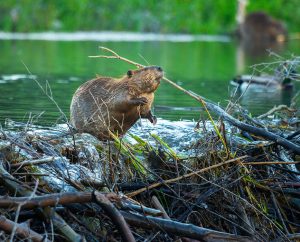
November 30th is Lost Species Remembrance Day
This day of distinction was created in 2011 as a reminder of the importance of every species, especially those already lost, in the vast web of life on Earth. As important as remembering the lesson of species lost, this day has been suggested as a reminder to protect and conserve species while they are common, especially keystone species such as beavers. Salmon are also a keystone species but their numbers have dwindled so low that the web of life that directly depends on salmon is starting to unravel and at a point far more difficult to restore.
Check out this interesting article in Scientific American by Michelle Nijhuis explaining the wisdom of early conservation of all species, keystone ones in particular.
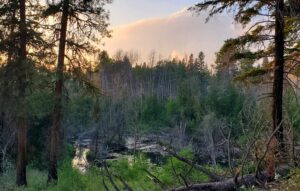 November 2020
November 2020
MBP has been awarded WA State's Department of Ecology Water Resources Streamflow Restoration Program Grant

Our collaborative proposal, Restoring Streamflow after Wildfire in Okanogan & Methow River Sub-basins, will implement actions to
restore streamflow/floodplain connection in 8 wildfire impacted streams, 4 in the Okanogan River & 4 in the Methow River watersheds using
process-based restoration strategies. Strategies include: woody structure installations, wood placement, repair of historic beaver dams, riparian
plantings, and beaver reintroduction. Legacy stream degradation from human activities, climate change, increasing scale/severity of wildfire, and broad collaboration among local, regional and state partners make restoration actions timely, practical, and feasible.
To find out more, or learn how to get involved with beaver mediated stream restoration, sign up for our Newsletter or email us at methowbeaverproject@methowsalmon.org.
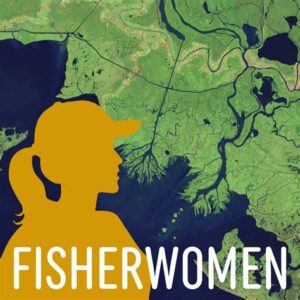
Looking for some fresh content to add to your digital library? Check out "The Fisherwomen" podcast, where fisheries biologist Katie Osborn interviews interesting folks in fisheries, aquatic and riparian conservation. This week features MBP's very own Alexa Whipple, who dives deep into the pond weeds on beaver mediated stream restoration, wildfire resiliency, and salmon recovery. Subscribe here.
Give Methow is ON! - The annual fundraiser for Methow Valley based community non-profits during the month of October!
Learn more about and help support the Methow Beaver Project's expanded beaver coexistence and stream restoration mission and our new Student's in the STREAM High School program. Check out our short 1 minute speed dating (or donating) video for inspiration, hope, and a good laugh. Thanks for giving and supporting stewardship and RESILIENCE in our community!!
Go to Give Methow's donate page, scroll down to find Methow Beaver Project or other Methow organizations and express your love and commitment to the Methow with your support!
Give Methow is helping the Methow Beaver Project build RESILIENCE in the Methow and Okanogan Valley Watersheds!
MBP's One Minute Mission Speed Dating (or Donating) Video!
Beaver Coexistence Strategies in the Methow are helping Coho salmon access critical and limited spawning habitat
Salmon habitat for spawning and juvenile rearing and overwintering is limited throughout historic salmon bearing streams. This is primarily due to humans modifying streams with levies, bank armor, culverts, dikes, and dams to protect infrastructure and land use priorities but also to move water efficiently through the landscape for human use. These activities have reduced the natural function of our watersheds for water storage on the landscape but also for the dynamic and complex habitat that salmon and other aquatic and terrestrial organisms need to live and reproduce. River and stream channels naturally create dynamic and complex habitat when allowed to migrate across the floodplain rather than being confined to straightened and armored channels. Beavers help create slow and deep water habitat in these channels that provides refuge for juvenile salmon during high flows as well as during extreme seasonal temperatures. Beaver dammed side channels also provide some species of salmon, like Coho, with preferred spawning habitat.
When critical habitat is so limited for our threatened and endangered salmonids, we want to reduce the challenges our salmon face when rearing in or returning to the Methow. Historically, the riverscape was so complex and shifting that beaver dams were not a challenge to salmon passage, afterall, beavers and salmon evolved together and salmon are incredibly athletic barrier jumpers. Only with overwhelming human influence on the watershed has the salmon and beaver population been reduced dramatically with simplified, extracted, and managed systems being the prime influence.
Methow Beaver Project (MBP) is working with habitat and fisheries biologists across Okanogan County and the region to help reduce modern perceived and potential barriers to salmon passage in beaver dammed side channels with beaver coexistence strategies such as fish passage flow devices. The photo below shows a beaver with 2 Coho salmon swimming together near our newly installed fish passage/flow device intake protection cages slightly above the water surface. The cages protect the device from beaver discovery and blocking with mud or debris but allow for juvenile and adult salmon passage. The adult Coho most likely entered this beaver dammed side channel in September through the device installed in July 2020 on WA Dept of Fish and Wildlife-Methow Wildlife Area property.
Our beaver/salmon/human coexistence strategies are working!!! Thank you to our partners in coexistence including WA Dept of Fish & Wildlife, WA Salmon Recovery Funding Board, Confederated Tribes of the Colville Reservation, Methow Salmon Recovery Foundation, Defenders of Wildlife, and USFWS. To learn more or seek help with any beaver challenges, call 509-289-2770!
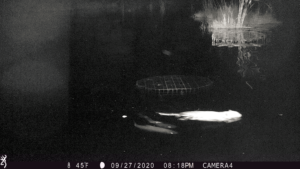
2020 Methow Beaver Project Beaver Celebration
Sign up for our virtual evening Edu-tainment event on September 19th and in-person site tours on September 20th. Follow this link to join the movement and celebrate partnering with beavers for healthy, sustainable and wildfire resistant watersheds!!
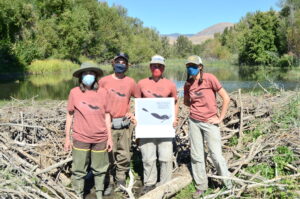
Catchy Beaver Tunes are never Old News - It's time for a Beaver Riot
Click here to listen to GOTTA CHEW! by Ken Bevis (Wildlife Biologist with WA Dept of Natural Resources) with Julie Vanderwal (Okanogan Highlands Alliance) and Sandy Vaughn (Triple Creek Land Stewards)
We teamed up with Okanogan Highlands Alliance in January 2020 to share an evening of "Edutainment" sharing and celebrating watershed restoration actions occurring in Okanogan County! We featured original music, local musicians and informative presentations about the need and the strategies for adding structure to our streams to restore natural watershed processes like floodplain connectivity during high spring flows. What seems like a simple process, reconnecting floodplains, actually jump starts a series of processes that we all depend on like increased water storage, recharge of groundwater, and extended late season flows from the slow transfer of groundwater back to streams. This makes our watersheds more resilient to climate change (increased drought & wildfire), keeps our endangered salmon happier (all stream & riparian dependent critters really), and helps keep water flowing to human communities too. You can check out more of the evening in the following videos...
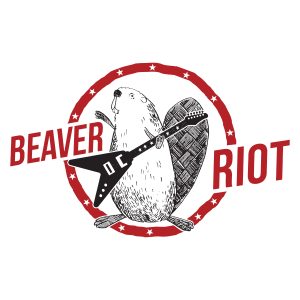
Explore These Beaver Film Shorts
Dam It; Why Beavers Matter
Ben Goldfarb, author of Eager: The Secret Life of Beavers and Why They Matter, takes the viewer on a wonderful wetland adventure exploring the amazing world of beavers and their remarkable contributions to our watersheds. The video also provides indoor and outdoor activities for students of all ages.
Beavers and Wildfire!
Dr Emily Fairfax created this short video exploring how beaver ponds transform a simplified stream into a marshy wetland, and how those same ponds become a safety zone during wildfires.
Beavers Support Beef Production
Jay Wilde, an Idaho rancher, figured out a crucial missing element from his parched ranch and range lands...beavers. Bringing them back has been a restoration love story. Find out more at the link below.
https://www.beefmagazine.com/sustainability/beaver-power-provides-year-long-water-idaho-ranch
Think Like A Beaver!
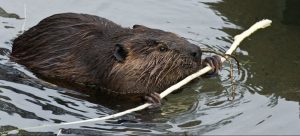
Check out Oregon State University's new 4th-5th grade Science curriculum focused on Beaver Ecology at the link below.
